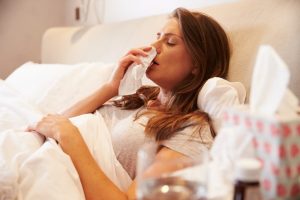
When we sleep, the body can begin healing and restoring itself, which means building your immune system to fight off any infection or illness. On the other hand, lack of sleep can be a contributing factor to illness.
At the first sign of illness – frequent sneezing, runny nose, or a tickle in your throat – it’s wise that you head to bed a bit earlier than normal to curb a full-blown illness along with promoting a quicker recovery.
So how long should you sleep to feel better? Experts suggest listening to your body, which means if you feel tired, just go to sleep instead of trying to fight it. If you work during the week and have a set time you need to be up, you may consider heading to bed one or two hours earlier to catch some extra health-boosting shuteye.
Furthermore, with some illnesses, you may find yourself tossing and turning, which means you’re missing out on some crucial sleep. Because of this, it’s even more important to get extra sleep whenever you can.
Although there isn’t a magical number of hours to aim for when sick to promote recovery, the best thing you can do is simply listen to your body and go with what it’s telling you.
If you’re homesick, then take advantage of mid-day naps, as they can help you along the road to recovery.
Along with getting adequate sleep, you can further aid recovery with soothing herbal teas with honey which can help suppress some cold and flu-related symptoms.
To sum it all up, the best thing you can do at the first onset of a cold or flu is head straight to bed.
Also read:
- Yoga for Sleep: Simple Yoga Exercises for Restful Sleep
- Essential oils for sleep: 13 ways to get the best sleep ever
- Effective Yoga Poses for Brainpower